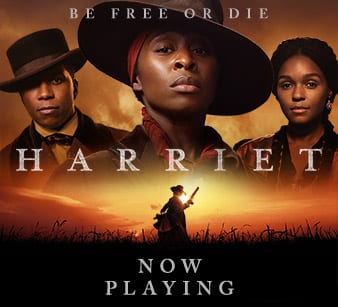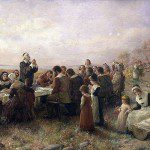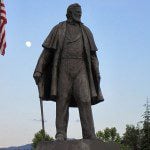
My wife and I just now returned from a showing of the film Harriet.
We loved it. Absolutely loved it. When I first saw Cynthia Erivo in the role of the slave Araminta Ross, or “Minty,” who would become the great Underground Railroad “conductor” and abolitionist Harriet Tubman, I confess that I wasn’t sure that she could do it. But she carried the film. She could well win a Best Actress Oscar.
And I hereby make another prediction: The song Stand Up — which was co-written by Cynthia Erivo herself with Joshuah Campbell, and which she performed — will be nominated for an Academy Award and will likely win that Oscar.
Harriet is an extremely powerful film. It vividly portrays the great national sin of the United States of America and one heroic life devoted to putting an end to that sin. I hope that you will take the opportunity to see the film.
Many readers of this blog — I’m assuming that there are more than just tiny handful — will be particularly interested in the religious dimension of Harriet Tubman’s story, in the visions and premonitions that she experienced and that, she said, helped her in carrying out her dangerous missions.
A passage from Abraham Lincoln’s second inaugural address, which he delivered on 4 March 1865, slightly more than a month before his assassination, seems appropriate here:
Both [North and South] read the same Bible and pray to the same God, and each invokes His aid against the other. It may seem strange that any men should dare to ask a just God’s assistance in wringing their bread from the sweat of other men’s faces, but let us judge not, that we be not judged. The prayers of both could not be answered. That of neither has been answered fully. The Almighty has His own purposes. “Woe unto the world because of offenses; for it must needs be that offenses come, but woe to that man by whom the offense cometh.” If we shall suppose that American slavery is one of those offenses which, in the providence of God, must needs come, but which, having continued through His appointed time, He now wills to remove, and that He gives to both North and South this terrible war as the woe due to those by whom the offense came, shall we discern therein any departure from those divine attributes which the believers in a living God always ascribe to Him? Fondly do we hope, fervently do we pray, that this mighty scourge of war may speedily pass away. Yet, if God wills that it continue until all the wealth piled by the bondsman’s two hundred and fifty years of unrequited toil shall be sunk, and until every drop of blood drawn with the lash shall be paid by another drawn with the sword, as was said three thousand years ago, so still it must be said: “the judgments of the Lord are true and righteous altogether.”












